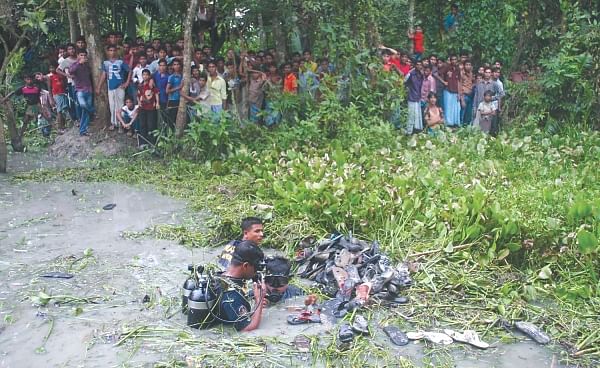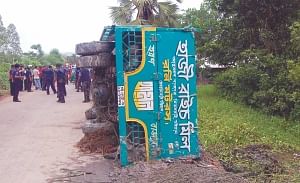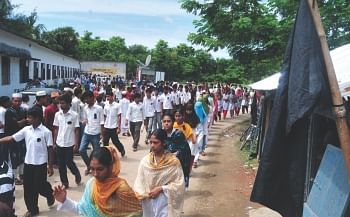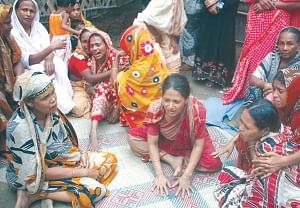| Home - Back Issues - The Team - Contact Us |
 |
| Volume 10 |Issue 28 | July 22, 2011 | |
|
|
Special Feature
The Price of Reckless Driving Emran Hossain July 11, 2011 was the first time in his life that Joynul Abedin had entered a football stadium. More than the gigantic stadium what thrilled him most on that day was the company of his two sons. Abedin considered himself lucky for being the driver of a CNG-run three-wheeler, hired for carrying players by Abu Torab Government Primary School, the team his sons supported. His younger son was sitting beside him in the driver's seat while the elder son, Tareque Hossain, remained behind to come in a truck the school managing committee had hired to take supporters of their union, Mayani at Mrsarai in Chittagong.
Back at the stadium, his son, along with other boys, mostly from Abu Torab Bahumukhi High School, was sorting out plans to contain the defeat by one goal. Most of the high school boys were former students of the primary school and had gone to the stadium to support their juniors. Finally, about 70 people, mostly students, boarded the truck and began shouting at the top of their lungs giving the impression that they had returned victorious. “Two goals, two goals,” 70-year-old Halima heard the students shouting as the truck appeared over a culvert on the metalled road that goes in front of her house. Halima was returning from the house of a neighbour from opposite direction at around 1:30pm. Before Halima could understand what was happening she watched in horror as the truck flipped over into the roadside ditch fully covered with water hyacinth. In a few moments the truck settled down on the muddy bed of the ditch with its passengers entrapped under its flipped over open-back. Suddenly everything went silent and Halima could not gather enough strength to scream. “Don't run. Please help rescue the children who are still alive,” a voice broke the silence. It was an appeal made by Mohammad Alamgir, one of the ten people who survived the accident without any help, as the trucker, Mofiz, escaped after coming out through the truck window. Escape was the last of a series of steps Mofiz, a resident of the same Mayani union, had taken on that day to end up in the ditch, actually a roadside hole created during road construction. The authority had been reluctant to elevate the road with earth collected from a distant place and dug the hole just beside the road.
Time was running out for many of the trapped children but it went slowly for Alamgir as he continued the salvage operation alone. A few passersby and passengers from vehicle passing through the road only looked on as if watching a live performance. It was not before an hour that the police and fire service men would begin the rescue mission, when there would be no one to be rescued. In the first 15 minutes only a few rickshaw pullers and CNG drivers joined hands, not enough people to turn over the truck. “I shouted again and again for help until I felt my mouth was going to bleed,” regretted Alamgir, adding, “Had they valued human life more than mobile and money, more lives would have been saved.” Soon people of the entire Mayani union turned up at the spot. In half an hour they pulled the truck to one side and then turned it to the other side before announcing the rescue completed before government men. “The more we lifted the truck, the more dead bodies came out,” said Nizamuddin, a local rescuer, who managed to rescue his nephew, Imran, a class X student of Abu Torab High School, among the ten others who were among the few alive at the time of the rescue. Abedin came to the scene silently, unable to remember even if his son was among the soccer fans. He walked restlessly on the bank, already filled with rescuers. Abdein desperately searched for some sign of his son. “A child could not keep his balance and almost fell off the truck, which jerked violently as the driver sped up and drove in a zigzag fashion,” said Imran. When students screamed loud to slow down, the driver continued to drive recklessly. Some senior students caught the falling child by his hand and saved his life. “A twelve-year-old boy peed in his pants on the truck out of fear as he could not stand the pace and incessant jerks,” said another survivor of the accident Abu Jubair, a student of Abu Torab Bahumukhi High Schoool. “Just before the accident I saw the trucker was driving with his left hand as he held a cell phone in his right hand.” Soon the drama reached its climax and Abedin found out that the body that had just been recovered was his son's. He decided to carry the body on his shoulders and walk. Unlike other fathers receiving bodies of their children who were consoling each other that it was God's will and that their children had gone to heaven Abedin could not accept this thought. “Why does a child have to endure so much pain and then death? Is it the will of God only to take him to heaven? Would heaven be a better place to live rather than seeing his parents or growing up?” Abedin lost consciousness as soon as he returned home.
The green village had turned deathly pale with grief. The night could not hide the pain. In the light of moon, which would be full in a couple of days, the night saw 39 children lie lifeless in an open field. Nobody slept that night. Nobody had the courage to talk to the inconsolable mothers. Fire burnt the wax to light up the faces of the dead, visited by the relatives, teachers, friends, and even foes. A survivor would die from his injuries on July 16. The more everyone came to know about the accident the angrier they became with Mofiz, the driver of the truck who had paid no heed to the children's request to slow down. As everyone was blasting Mofiz, the absconding driver, Abedin cried as he embraced his friend Nurul Huda, father of Imon, a class six student of the High School. A God-believing man, Nurul Huda tried his best to console his childhood friend. His words sliced through the heavy darkness of grief. “The question is who provided the truck" said Huda. "The students might not even have thought of attending the game spending Tk 36 each, if the truck had not been provided,” he told journalists. In his recollection the day before the accident, local leaders had asked students to attend the football match in the transportation they had arranged for free. Huda had not allowed his son to go. “In the afternoon the day before the accident, school managing committee members accompanied by teachers asked me for money for the transportation expense of the tournament,” said Nizam Uddin, uncle of Shakhawat Hossain Nayan, one of those who died in the accident. Nizam paid Tk 100 for the purpose. Shopkeepers from Mayani Bazar, a big village market with no less than 500 shops, remembered how newly elected members of the union parishad accompanied by primary school teachers, collected donations from them for arranging the tournament. But the truck was taken on courtesy, only for paying Tk 200 for fuel. “The budget was insufficient to bear all the expenses including food of the players. So we had no alternatives but to raise funds from the market,” Abu Torab Government Primary School head master Nihar Kanti Roy said to the journalists, as he consoled Jahir Uddin, head of the school managing committee, who also had lost a son in the accident. Where had all the money gone – the locals wondered since the only transportation provided was the killer truck, a mini truck capable of carrying only 2.5 ton of weight. The soccer tournament for which the teachers had to raise additional funds and for which the truck had been hired, was part of a government programme. The organisers of the ill-planned tournament had not even thought about something as basic as safe transportation of the children, promising only a cup named Bangabandhu Gold Cup, a cup that has no gold in it. Abu Torab primary school won championship at the union level competition of the tournament, which covers a huge volume of activities until it ends at the national level, with only two schools from the country facing in the final. The budget for entire tournament, which began in 2010, for a school is only Tk 2,000. The game the boys lost that day was the first match in Upazila level. The anger reduced fast when faces of the key man behind launching the tournament and arranging it appeared before the bereaved families. Fear surfaces only to suppress the wailing. Keeping their heads bowed they sob when the local umion parishad chairman, Kabir Ahammad Nizami, head of the tournament management committee at the union level, arrives. The family members, mostly poor and illiterate, saw how Sanjib Chakrabarty, member of 6 no ward of Mayani union who hired the truck, moved anxiously making arrangement for the burial of their children. The days following the accident Mayani became a village full of activities, journalists rushed in, ministers, political leaders' and bureaucrats to visit the area, especially the high school, which lost 29 students in the accident. Abedin passed the next few days in a daze. His interview was shown on television over the next few days. Men and women in smart clothes arrived to meet him in his ramshackle house. They gave him yellow and white coloured envelopes full of money and did not bargain for once. Abedin cannot find Tareque from the crowds of people, some of them with their lenses and cameras. He does not understand what has happened to him. He feels numb and empty inside. The writer is Staff Reporter, The Daily Star. Copyright
(R) thedailystar.net 2011 |



